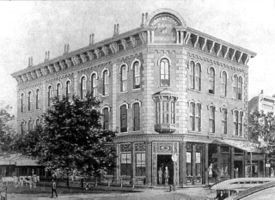National Bank of Birmingham building: Difference between revisions
No edit summary |
No edit summary |
||
| Line 1: | Line 1: | ||
[[Image:Linn's Folly.jpg|right|thumb|275px|Early view of the First National Bank building]] | [[Image:Linn's Folly.jpg|right|thumb|275px|Early view of the First National Bank building]] | ||
The original '''National Bank of Birmingham building''', commonly called '''Linn's Folly''', was a three-story brick building constructed in [[1872]] and [[1873]] on a $400 lot on the northeast corner of [[1st Avenue North]] and [[20th Street North|20th Street]] for [[Charles Linn]]'s [[National Bank of Birmingham]]. It was the first multi-story commercial building to be built in [[Birmingham]]. | The original '''National Bank of Birmingham building''', commonly called '''Linn's Folly''', was a three-story brick building constructed in [[1872]] and [[1873]] on a $400 lot on the northeast corner of [[1st Avenue North]] and [[20th Street North|20th Street]] for [[Charles Linn]]'s [[National Bank of Birmingham]]. It was the first multi-story commercial building to be built in [[Birmingham]] and also housed a large ballroom called '''Linn Hall'''. | ||
Masons for the work were brought in from Louisville, Kentucky. Because the $36,000 structure was erected in the midst of a national economic depression, when the prospects for the new city of Birmingham were anything but sure, the building earned the nickname "Linn's Folly". | Masons for the work were brought in from Louisville, Kentucky. Because the $36,000 structure was erected in the midst of a national economic depression, when the prospects for the new city of Birmingham were anything but sure, the building earned the nickname "Linn's Folly". | ||
Undaunted, Linn completed the building and organized a lavish "[[Calico Ball]]" to celebrate its opening on December 31, 1873. The event is marked as a turning point in the fortunes of Birmingham. Later nicknames for the structure, which was a landmark at the city's commercial center, included '''Linn's Wisdom''' or '''Linn's Fame'''. The [[Brown Marx Building]] now occupies this site. | Undaunted, Linn completed the building and organized a lavish "[[Calico Ball]]" to celebrate its opening on [[December 31]], [[1873]]. The event is marked as a turning point in the fortunes of Birmingham. Later nicknames for the structure, which was a landmark at the city's commercial center, included '''Linn's Wisdom''' or '''Linn's Fame'''. The [[Brown Marx Building]] now occupies this site. | ||
==Tenants== | ==Tenants== | ||
Tenants in the National Bank Building included [[Garrett, Phelan & Underwood]] attorneys | Tenants in the National Bank Building included [[Garrett, Phelan & Underwood]] attorneys, and [[E. S. Bliss]], agent for the Lima Machine Works. | ||
==References== | ==References== | ||
Revision as of 10:59, 23 March 2014
The original National Bank of Birmingham building, commonly called Linn's Folly, was a three-story brick building constructed in 1872 and 1873 on a $400 lot on the northeast corner of 1st Avenue North and 20th Street for Charles Linn's National Bank of Birmingham. It was the first multi-story commercial building to be built in Birmingham and also housed a large ballroom called Linn Hall.
Masons for the work were brought in from Louisville, Kentucky. Because the $36,000 structure was erected in the midst of a national economic depression, when the prospects for the new city of Birmingham were anything but sure, the building earned the nickname "Linn's Folly".
Undaunted, Linn completed the building and organized a lavish "Calico Ball" to celebrate its opening on December 31, 1873. The event is marked as a turning point in the fortunes of Birmingham. Later nicknames for the structure, which was a landmark at the city's commercial center, included Linn's Wisdom or Linn's Fame. The Brown Marx Building now occupies this site.
Tenants
Tenants in the National Bank Building included Garrett, Phelan & Underwood attorneys, and E. S. Bliss, agent for the Lima Machine Works.
References
- Jackson, Harvey H. (2000) The WPA Guide to 1930s Alabama Tuscaloosa: University of Alabama Press, pp. 168-169. ISBN 0817310282
- Birmingham Area Chamber of Commerce (1976) Century Plus: A Bicentennial Portrait of Birmingham, Alabama 1976 Birmingham: Oxmoor Press, p. 16.
- White, Marjorie Longenecker (1977) Downtown Birmingham: Architectural and Historical Walking Tour Guide. Birmingham: Birmingham Historical Society.
- Kilpatrick, Andrew (1996) A Legacy of Leadership: The History of AmSouth Bank. Birmingham: AmSouth Bank
